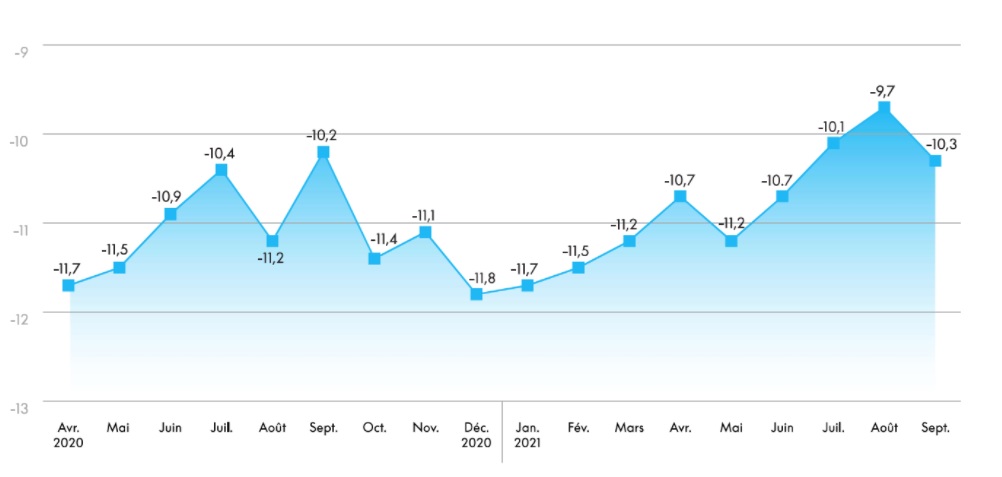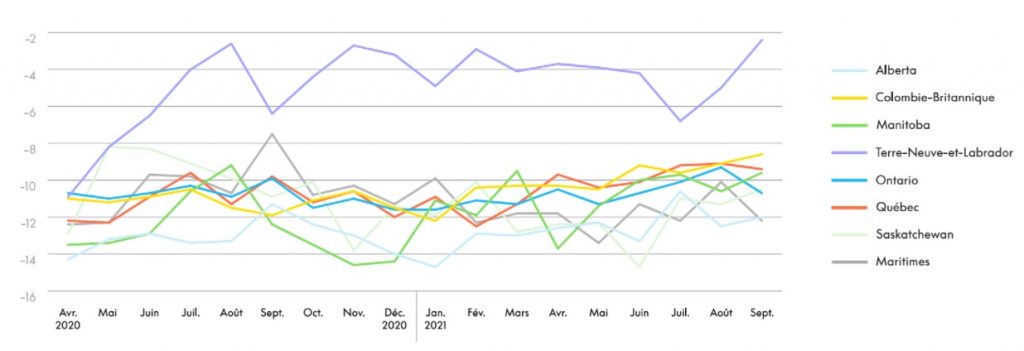For its traditional monthly report on mental health across the country, LifeWorks Wellness Solutions reports that the older employees are, the more likely they are to consider quitting due to feelings of lack of recognition. Analysis.
For the 18th month in a row, the country has had a negative mental health score. The score is -10.3 compared to the pre-pandemic baseline. This marks the first decline after three consecutive months of improvement.

Note that the score for women (-12.3) is much lower than the score for men (-8.3) since the launch of the index. And if we look at the figures by province, apart from Newfoundland and Labrador, Quebec is rather at the top of the table, even if British Columbia has just passed ahead in this edition.

Increased stress is a major factor in resignation
For this monthly report, LifeWorks Wellness Solutions looked at employee turnover in Canada. More than one-third of Canadians (35%) said they are considering or reluctant to leave their jobs. These groups had mental health scores that were more than three times lower than those of respondents who were not considering quitting.
According to the study, an explanatory factor can be found in the intersection of age and lack of recognition. For example, older employees feel disproportionately unappreciated at work, with 35% of respondents aged 40-69 reporting that lack of recognition is the reason they are thinking of quitting, compared to 9% of those aged 20-39.
Another interesting clue to understanding the reasons for this desire to leave: stress! 18% of respondents who left their jobs during the pandemic say they did so because of increased stress at work. For a third of respondents, job stress has increased since the pandemic.
Also, 16% of respondents left their jobs because of their caregiving responsibilities. This group has the worst mental health score (-28.4). Participants with children were more than twice as likely as those without children to report leaving their jobs during the pandemic.
Ongoing workplace changes and uncertainty for the future continue to increase the mental strain that employees are experiencing, and Canadians are indicating that actions speak louder than words when it comes to how employers address this. Building a supportive culture that speaks about and provides resources for mental health needs is a great first step. Employers must recognize that employees are considering resigning from their jobs if they don’t get support. An investment in employees is an investment in business success,” says Stephen Liptrap, president and CEO of LifeWorks.
The importance of feeling heard and valued
The study also found that almost half (47%) of respondents report that their employer did not ask them about their work preferences following the pandemic (and this group has the lowest mental health score (-11.6)). Only one-third (33%) of respondents report that their employer asked them about their work preferences.
Among the requests made by employees: flexibility regarding hours (32%) or location (29%), far ahead of a better work environment (17%) or fewer meetings (15%). The desire for flexibility is even stronger when respondents have children.
Nevertheless, 20% of respondents indicate that their employer does not allow much flexibility in work-related preferences.
Feeling heard and valued are critical to employee satisfaction and total wellbeing. To foster a healthy workplace, it is not only critical that employers look beyond policy to consider their employees’ unique wants and needs, but that they also provide ongoing opportunities for workers to share their thoughts and feelings in an unbiased, safe environment. Listening to employees’ views plays a crucial role in ensuring they feel valued and motivated to continue doing their best work,” explains Paula Allen, global leader and senior vice president, Research and Global Wellbeing.
A word about salary as well. Nearly three-quarters of respondents (74%) would leave a job where they are happy for a pay raise. Specifically, one-third would do so for a 20% or less pay raise.
About the Mental Health Index
This monthly LifeWorks Wellness Solutions survey was conducted using an online survey in English and French from September 2 to 10, 2021, of 3,000 respondents in Canada. All respondents live in Canada and were employed within the prior six months. Data were statistically weighted to ensure that the regional and gender composition of the sample is representative of this population. The Mental Health Index has been published monthly since April 2020. Benchmark data was collected in 2017, 2018 and 2019.




